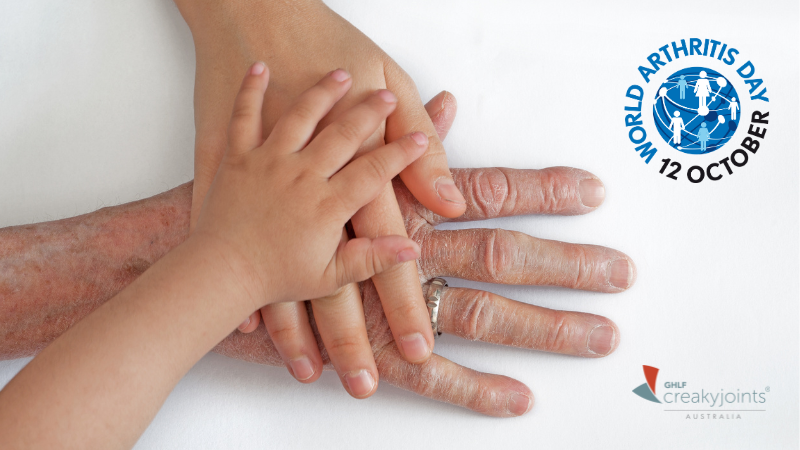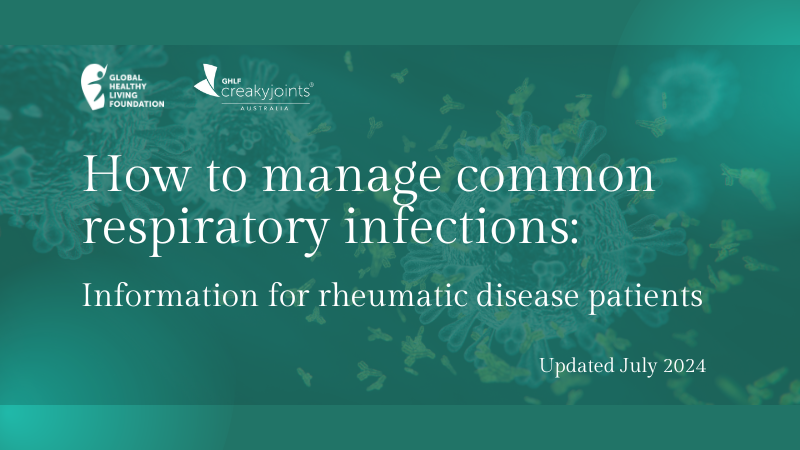

When many people think of arthritis, they think of older adults with swollen joints and reduced mobility but they might not know much about it beyond that.
It is likely the people they think of have osteoarthritis (OA), which is one of over 100 conditions affecting the joints and surrounding structures that fall under the umbrella term of arthritis. Each of these can range in severity from minor swelling of one or two joints to severe, chronic and disabling symptoms with major impacts on quality of life.
True, OA is the most common form of arthritis in Australia and it affects around 36 per cent of adults aged 75 years and over. However, like other forms of arthritis, OA can affect people of all ages, even children. Other common forms of arthritis include:
- Rheumatoid arthritis
- Ankylosing spondylitis/axial spondyloarthritis
- Psoriatic arthritis
- Gout
- Juvenile arthritis
#WorldArthritisDay2023
12 October 2023 is World Arthritis Day. This year, the aim is to promote awareness of the existence and impact of arthritis and other related conditions at different life stages. Through our own lived experience and hearing the stories of others in our CreakyJoints Australia community, we are very conscious of common impacts across all age groups in our community.
We’d like to share some of these with you so that when you think of the term “arthritis” from now on, you’ll have a deeper understanding of these conditions and their impacts.
Growing Up with Arthritis
Juvenile arthritis refers to forms of arthritis that appear in children under 16 and affects around 6,000 Australian children. It tends to begin in toddlers but can appear in very young babies.
There is no known cause for JIA but it can be triggered after the child has a virus or infection. After the original condition has passed, the immune system fails to revert to normal. Instead, it mistakenly starts to attack healthy cells in the joints and connective tissues. There are several types of JIA, determined by the number and location of affected joints.
Symptoms can come and go, sometimes for extended periods. In some cases, they disappear as the child gets older. However, some children continue to have JIA symptoms throughout their lives.
Having autoimmune arthritis at an early age can impact the child’s bone development and potentially stunt their growth. Daily life for these children and their families can appear “normal” on the surface. In reality, it often includes regular medications (including injections), doctor’s appointments, scans and blood tests and, of course, the ongoing symptoms.
Children and adolescents with JIA are also less likely to participate in physical activities due to their pain and fatigue. This can have lasting negative effects on their physical and mental health and social engagement. For example, they may experience:
- Stigma and embarrassment, especially for visible symptoms such as swollen joints.
- Resentment of the time spent on treatments or dealing with symptoms.
- Guilt about the pressure on parents and other family members.
- Anxiety or depression, such as when they contemplate their future.
One of the positives sometimes mentioned by those who were diagnosed very young is they have never known life any other way. They see it as just part of growing up.
On the other hand, people who are old enough to remember their life before arthritis have to deal with the shock of their diagnosis and some may grieve for the things they can no longer do.
Transitioning to Adulthood
Teenagers or young adults with arthritis can be especially conscious of the impacts it has on their social lives. For example, if they have a big party coming up, what do they do if they have a flare-up that day? Do they push through and go anyway knowing that they may feel much worse for days afterwards? Or do they stay home and deal with feelings of social isolation on top of their symptoms?
What about going out on a date? Do they explain why they limp or can’t have too much alcohol at the risk of being teased, misunderstood or rejected by the other person?
Then there are the practical aspects of disease management to consider. Those who have childhood arthritis may go into remission for years but with the thought that it may reappear at some point in their future.
People over 18 are also responsible for their own healthcare management. This can be especially hard if their parents had previously managed everything for them or if they need to transition from a paediatric to an adult rheumatologist.
Another factor that can start to creep in around this stage is the increased risk of developing additional conditions. These can include autoimmune conditions, fibromyalgia, bowel or heart issues and much more. Sometimes, these are preventable, but generally not. However, they can be managed by following regular good health practices such as maintaining a healthy diet and doing some form of regular exercise.
Pregnancy and Parenthood with Arthritis
Young people with arthritis often experience anxiety about future pregnancies and parenthood. Can they have children? Will they have to stop their medication? Will they be able to look after a child if they are in a flare themselves? Could they pass their condition on to their children?
“I developed juvenile arthritis at age three and am now 47. I have two beautiful girls; I don’t think the doctors thought ‘that’ would happen but I proved them wrong!” — Shirani W.
“I was diagnosed with rheumatoid arthritis when my kids were two and five years old. Within weeks of my diagnosis, I couldn’t prepare the food for my kid’s birthday party. Then, I couldn’t push my daughter on the swing and within a few months I couldn’t get out of bed to pick up my oldest from school.” — Annette B.
The good news is that most women with arthritis can have successful pregnancies. The key for them is to discuss their treatment options with their treating rheumatologist and GP as soon as possible when planning a family. There are also many forms of support available for parents with arthritis.
Impacts of Arthritis on Work and Other Activities
While the symptoms of arthritis are largely invisible, they can still have a huge impact on many aspects of life. For example, pain, fatigue, sick days and regular medical appointments can affect people’s ability to do their job effectively.
Some people don’t want to disclose their condition to their boss or colleagues. Others look for ways to adapt their work around their needs. This might include asking for fewer or flexible hours or using adaptive equipment (such as sit-stand desks). Unfortunately, some need to change the type of work they do or even stop working altogether.
“I was diagnosed with rheumatoid arthritis just as I turned 21. I had started working full time and studying my dream university course. I was also very fit. My arthritis changed all of that for me.
I’ve had many ups and downs, including being told that my arthritis is so severe that I’ll never go into remission. That is evident with the number of medications I’ve been on over time. I’m now running out of options and can only receive medication infusions at a hospital.” — Amy T.
Learning to Live Well with Arthritis
Even though arthritis has its challenges, it is still possible for us to lead happy and rewarding lives. The three wonderful ladies who generously shared their stories here can attest to that. We’ll leave you with their final words.
“My arthritis still affects me today. I have difficulty doing household jobs and can’t work because of it. However, there are better treatments around these days so this won’t be the case for everyone. I have a fulfilling life doing health advocacy work and spending time with my family and friends.” — Shirani W.
“It took about 12 months to get my medication to a point where I could do the basics in life, but it wasn’t until I went on biologic medications that I could function enough to work part-time. Eleven years on, and three biologics later, I still work part-time and am delighted to be able to do so. Thankfully my kids are old enough to get themselves where they need to go.” — Annette B.
Some people are surprised that someone my age has arthritis yet can continue with everyday life and all that it throws at me! But even though I still have pain and fatigue, why shouldn’t I?” — Amy T.
How You Can Help People with Arthritis
We hope that your increased awareness of the nature of arthritis will give you a better understanding of what it is like to live with it. We want you to value us for what we can do, rather than what we can’t.
We still have goals and hopes like everyone else. It’s ok to offer to help us but don’t be offended if we say no. We might have other plans in place to help us achieve what we want to achieve.
There are many other things you can do to help our community, including:
- Believing us when we tell you about our symptoms or concerns and offering us emotional support when appropriate.
- Not seeing us as people to be pitied or avoided. Just treat us as equals.
- Helping to ensure our environments are fully accessible. For example, providing ramps or lifts as alternatives to stairs or not using disabled parking spaces if you aren’t eligible to do so.
- Helping us increase awareness of arthritis by sharing information (such as this article) throughout your network.
- Donating money or time to support arthritis research.
Arthritis Resources
- Juvenile Arthritis Foundation of Australia
- Musculoskeletal Australia – MSK Kids
- The Worst Pain in the World – Children’s Book by Nicky Johnston
- Arthritis, Pregnancy and the Path to Parenthood – Book by Suzie May
- Australian Rheumatology Association – For Patients
Join the CreakyJoints Australia Community
Becoming a CreakyJoints Australia member takes just a few minutes. You’ll receive our members’ e-newsletter featuring:
- Reliable information about arthritis types and treatments.
- Tips for managing daily life with arthritis and related conditions.
- Personal stories from people living with similar conditions to you.
- Links to our podcasts featuring interviews with health clinicians and patients.
- Surveys to help us discover what’s important to you.
Follow us on Facebook
We set up our CreakyJoints Australia Community group on Facebook to share our latest news, feature articles, arthritis resources and other content with you. We invite you to provide feedback on any of our posts and chat with each other in the comments. You are also welcome to share ideas about the content you would like us to create or share practical tips for living with arthritis and related conditions.
Keep Reading
- 10 Things to do After an Arthritis Diagnosis: Top Tips from Patients
- How the Spoon Theory Helps Me Explain the Fatigue of Chronic Illness
- How to Find a Peer Support Group
- Government Support for People with Chronic Conditions
- Health and Community Services Information for People with Chronic Conditions
Sources
Interview with Sanam Hafeez, PsyD, neuropsychologist, Director of Comprehend the Mind, and faculty member of Columbia University in New York City.
Interview with Haley Perlus, PhD, psychologist specializing in mental toughness, health and wellness coach, author, and Adjunct Professor at the University of Colorado.




